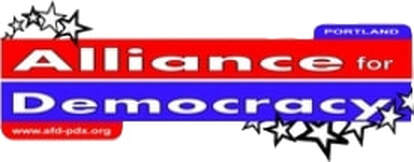| Home TPP page | ISDS Decisions | Wikileaks- Chapter on Intellectual Property RIghts | More on TPP | Major Reports | No Fast Track Authority
Fast Track Authority Approved by Congress
With a complex of votes, the US Congress has agreed to grant the president so-called Fast Track Authority to expedite the undemocratic approval of corporate trade agreements through Congress. Currently the administration is negotiating three agreements which could fall under this authority. All have been negotiated in great secrecy over the course of many years. Because of the secrecy, the American people are largely in the dark about the provisions and unable to have the robust discussion and debate which such far-reaching agreements will have.
For Oregonians, our trade traitors include Sen Wyden, Representatives Blumenauer, Bonamici and Schrader. All voted Yes for Fast Track Authority.
We now need to focus our energy on opposing and defeating the agreements themselves. First step is calling each of the above trade traitors (aka US Senators and Representatives) and tell them you oppose the Trans Pacific Partnership. Do not assume that because they voted for Fast Track Authority that they will be in favor of each of the agreements which will eventually come for a vote - the Trans Pacific Partnership (first), the Trans Altantic Free Free Agreement and the Trade in Services Agreement. The last two will not come forward for a vote until President Obama has left office.
For Oregonians, our trade traitors include Sen Wyden, Representatives Blumenauer, Bonamici and Schrader. All voted Yes for Fast Track Authority.
We now need to focus our energy on opposing and defeating the agreements themselves. First step is calling each of the above trade traitors (aka US Senators and Representatives) and tell them you oppose the Trans Pacific Partnership. Do not assume that because they voted for Fast Track Authority that they will be in favor of each of the agreements which will eventually come for a vote - the Trans Pacific Partnership (first), the Trans Altantic Free Free Agreement and the Trade in Services Agreement. The last two will not come forward for a vote until President Obama has left office.
President Obama Calls for Fast Track Authority
More Information on Fast Track Authority from Public Citizen's The Rise and Fall of Fast Track Authority or just read the conclusion here.
As part of the push to approve the Trans-Pacific Partnership, President Obama has now stated that he will ask Congress for Fast Track Authority (FTA). Fast Track Authority was first granted to President Ford (first proposed by President Nixon but he resigned prior to congressional approval) and has been used to enact almost every Free Trade Agreement since. Note that FTA is not required nor requested to enact traditional trade agreements which deal with tariffs and quotas; but because of the complexity of Free Trade Agreements, FTA is seen as required to enact Free Trade Agreements. A distinguishing characteristic of these agreements is that they largely involve non-tariff issues.
FTA allows the president to enter into and sign free trade agreements prior to any congressional approval. These agreements become law when the president signs them. For all other laws, congress must give its approval first and then when the president signs, it becomes law. FTA turns that standard democratic process on its head. Under FTA, Congress is not allowed to be part of the negotiations. After the negotiations are completed and the agreement has received the presidential signature, the implementing legislation, which includes changes to American law necessitated by the agreement, is presented to first the House for their vote and then to the Senate for their vote. Neither chamber is allowed to make any changes to the implementing legislation. Both chambers are required to vote within 90 days of the presidential presentation of the implementing legislation. Such rigid timelines for congressional approval means that neither Congress nor the public have adequate time to read and analyze these enormously complicated detailed agreements, agreements which will have significant impacts on labor public health the environment agriculture, financial regulation and more. And these rigid timelines are imposed on congress in spite of the fact that the president (and the corporate lobbyists) will have spend years negotiating the agreement. Democracy demands that congress not delegate its constitutional responsibility to negotiate trade agreements to the president. Such delegation is a major power grab on the part of the president. We need to demand that congress not approve Fast Track Authority. There is an excellent e-book from Public Citizen called The Rise and Fall of Fast Track Authority. This is what it says about the provisions/timeline of FTA: Core Aspects of Fast Track Trade-Authority Delegation
|
More Information
For effects on
Copyright law - Public Knowledge Electronic Frontier Foundation General - Public Citizen TPP2012 Internet Freedom - Electronic Frontier Foundation, The Trans-Pacific Partnership and the threat it poses to the Internet Procurement and American Jobs - Why the Trans-Pacific Partnership Would Hurt American Manufacturers Leaked Text While the negotiations are conducted in secret, some of the text has been leaked. Chapters on Copyright limitations, Investments, medical devices, intellectual property rights and more have been leaked. Read the leaked documents here. Read the text of the Investment chapter here. Access to medicines TPP Negotiations and the Controversial Issue of Pharmaceutical Test Data Protection by Mike Palmedo. This is a very detailed look at the problem which will result if the present content of the TPP regarding access to generic medicines in not changed. Brochure from Doctors Without Borders - Trading Away Health - The Trans-Pacific Partnership News stories/articles The TPP and the Slow-Motion Motion Corporate Coup - Lori Wallach (Yes! magazine article) A Trade Rule that Makes It Illegal to Favor Local Business? Newest Leak Shows TPP Would Do That And More - David Korten writing in Yes! magazine. |

